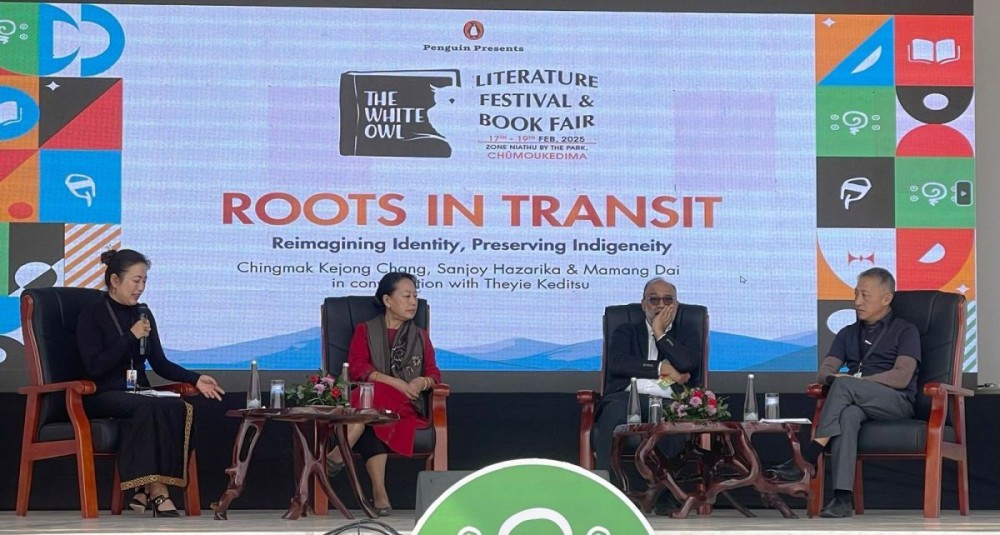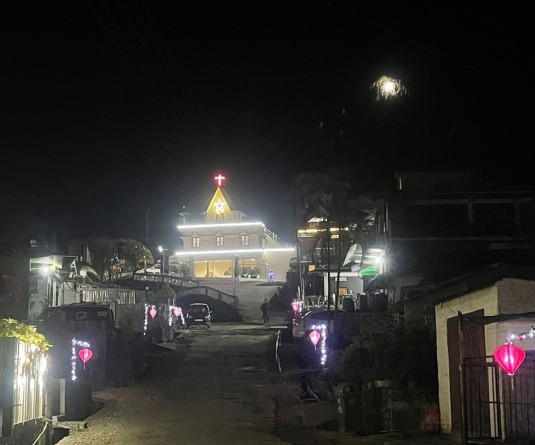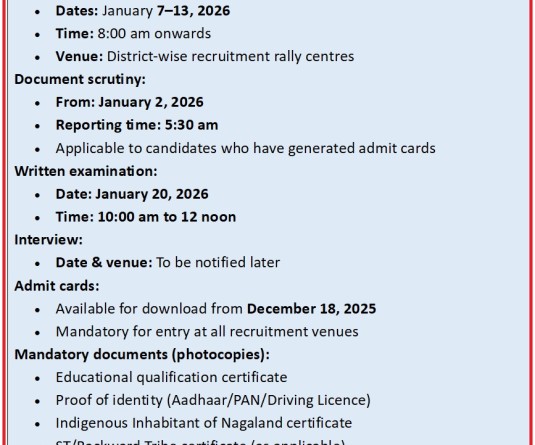Panel discussion titled ‘Roots in Transit: Reimagining Identity, Preserving Indigeneity’ at the ongoing Penguin White Owl Literature Festival and Book Fair in Chümoukedima.

‘Roots in Transit: Reimagining Identity, Preserving Indigeneity’ interrogates shifting realities
Moa Jamir
Chümoukedima | February 18
The rhythmic pounding of grain, the chants of the fields, and the haunting strains of dirges—once the essential pulse of indigenous life—resonated with a profound sense of loss at the panel discussion titled “Roots in Transit: Reimagining Identity, Preserving Indigeneity” at the ongoing Penguin White Owl Literature Festival and Book Fair in Chümoukedima.
Though there was an acknowledgment that traditions are disappearing, perhaps irreversibly, there remained a belief that something could still be done. The discussants explored the intricate relationship between food, culture, and identity while grappling with the impact of rapid development and globalization on indigenous life in Northeast India.
Moderated by Theyie Keditsu, the February 17 conversation featured three distinguished voices—writer and poet Mamang Dai, journalist and author Sanjoy Hazarika, and social worker and theologian Rev. Chingmak Kejong Chang—who reflected on their lived experiences and observations over the years.
Identity, Roots, and Imagination
Mamang Dai challenged the notion of “roots” as static entities, suggesting they are constantly negotiated and reimagined, even within traditional communities.
As a writer, she highlighted the crucial role of imagination in shaping identity, allowing individuals to time-travel, envision the future, and reconnect with their heritage while adapting to a changing world.
However, she stressed, land—the geographical space one occupies—ultimately, matters most when it comes to indigenous identity.
For Hazarika, who left Shillong as a teenager and returned in the ‘autumn’ of his life, storytelling has been a constant guide. He emphasized listening and learning from diverse perspectives, reflecting that understanding one’s roots comes from travelling, reading, and observing.
“We all carry stories from home, school, and daily life,” he said, adding that the way we share them shapes our identity.
Sense of loss
Rev Chang, drawing upon his pastoral and social work in rural Nagaland, emphasised the deep connection between identity and the land, particularly through food practices.
He recalled his time as a pastor in a small village where his salary was paid in kind—millet, maize, Job’s tears etc. “Thirty-five years ago, there were seven kinds of millet and fifteen types of kholar (beans),” he noted, amazed at the food diversity that once existed.
However, he observed a concerning shift—common ailments in the same village now include lifestyle diseases like hypertension and diabetes, once unheard of.
He attributed this to the erosion of traditional food practices and emphasised the need to prioritise food sovereignty over political sovereignty.
Recounting a funeral scene, he described how women mourned the dead by singing powerful elegies tied to jhum (shifting cultivation) cycles.
“There cannot be Naga culture without a connection to the land, and much of it is being lost,” he lamented.
Changing livelihoods and landscape
Rev Chang also highlighted the dilemma of education in Eastern Nagaland, where young people leave their villages for schooling but remain unemployable. “If they go, they receive an education but lack skills for farming (kheti). If they stay, they have no opportunities,” he observed, stressing the need to redefine education to keep young people connected to their land and culture.
To address this, he advocated for reviving the Morung (Sochum) concept in villages, emphasizing community-based learning as a foundation for both education and life skills.
Responding to questions on climate change, resource extraction, and development, Rev. Chang argued that many government policies work against indigenous ways of life, citing the promotion of monoculture, which displaces traditional agricultural practices. He shared an example of a “successful” System of Rice Intensification (SRI) project that increased rice production fourfold but led to unintended consequences
He recalled an old man saying during the celebration of the project,” “When we gave up jhum, we forgot our neighbours, lost our traditional songs, and our farmers’ groups disappeared.”
Regrettably, land ownership patterns are shifting as marginal farmers sell their land to wealthier individuals for monoculture plantations like tea and coffee, Rev Chang added.
“We once spoke of exporting ginger and other crops. Now we tell villagers, ‘Why don’t we grow food for ourselves?’” he said.
Hazarika also highlighted the impact of deforestation, citing thousands of trees cut between Guwahati and Goalpara for highway expansion. He emphasized the direct link between deforestation and climate change: “Each tree is an ecosystem in itself, providing shelter, shade, and balance to the environment.”
Environmental Consciousness and reconciliation
Echoing Rev Chang’s reflections on mourning songs, Dai shared how years of travel deepened her appreciation for indigenous traditions.
She also recounted a funeral where people discussed avoiding cutting “sleeping” wood at night, opting for bamboo instead, as “it never sleeps.”
“As a writer, such moments renew respect for the deep meaning woven into everyday life,” she said.
Dai also pointed out that many indigenous languages lack a distinct word for ‘environment’ because nature is not viewed as separate but as an intrinsic part of life. “Hills, mountains, trees, earth, and sky form an inseparable whole,” she explained, expressing hope that such relationships would be reflected in both fiction and non-fiction writing.
For Hazarika, reconciliation is a pertinent issue in North-East reflecting on the historical pain and struggles of the region but also highlighted significant reconciliation efforts, such as those in Nagaland and Khonoma. His book Strangers No More explores these themes in depth.
He also shared his visit to a ‘Healing Garden’ in Medziphema, where he observed a stark contrast—rubber plantations, monolith memorials of Naga national workers, a stone-crushing unit, and a stream with dwindling water. “The whole region is facing these challenges,” he remarked.
Hazarika also recounted his work with boat clinics in Assam, which emerged from hearing the tragic story of a woman who died in childbirth due to the lack of healthcare access in the Brahmaputra’s island communities.
“Listening to people’s stories can drive meaningful change,” he concluded.


.jpg)



